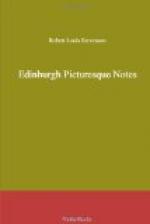More swing doors open into pigeon-holes where judges of the First Appeal sit singly, and halls of audience where the supreme Lords sit by three or four. Here, you may see Scott’s place within the bar, where he wrote many a page of Waverley novels to the drone of judicial proceeding. You will hear a good deal of shrewdness, and, as their Lordships do not altogether disdain pleasantry, a fair proportion of dry fun. The broadest of broad Scotch is now banished from the bench; but the courts still retain a certain national flavour. We have a solemn enjoyable way of lingering on a case. We treat law as a fine art, and relish and digest a good distinction. There is no hurry: point after point must be rightly examined and reduced to principle; judge after judge must utter forth his obiter dicta to delighted brethren.
Besides the courts, there are installed under the same roof no less than three libraries: two of no mean order; confused and semi-subterranean, full of stairs and galleries; where you may see the most studious-looking wigs fishing out novels by lanthorn light, in the very place where the old Privy Council tortured Covenanters. As the Parliament House is built upon a slope, although it presents only one story to the north, it measures half-a-dozen at least upon the south; and range after range of vaults extend below the libraries. Few places are more characteristic of this hilly capital. You descend one stone stair after another, and wander, by the flicker of a match, in a labyrinth of stone cellars. Now, you pass below the Outer Hall and hear overhead, brisk but ghostly, the interminable pattering of legal feet. Now, you come upon a strong door with a wicket: on the other side are the cells of the police office and the trap-stair that gives admittance to the dock in the Justiciary Court. Many a foot that has gone up there lightly enough, has been dead-heavy in the descent. Many




